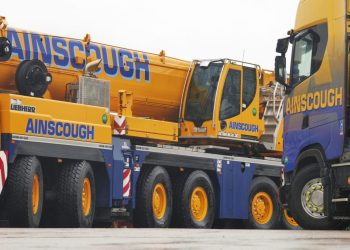Even in those occasions of emerging prices, a 3 thousand % build up in landfill tax charges is assured to lift fashionable alarm.
However that’s the minimal proposed build up in the price of sending inert subject material – which incorporates maximum development and demolition waste – to landfill over the following 5 years.
Beneath plans in a central authority session revealed in April, the present decrease price of £4.05 consistent with tonne for inert waste would build up in levels till 2030, when it will be withdrawn completely, leaving all waste charged on the most sensible price of £126.15 consistent with tonne – even supposing even that may build up too.
This announcement has brought about some comprehensible alarm within the business, with questions raised about how such an additional value may impact different govt goals – equivalent to house-building and infrastructure – or initiatives of any type that experience a industry case dependent at the £4.05 price closing to be had.
Different proposals come with the removing, through April 2027, of exemptions for quarry recovery – finishing the Qualifying Fines regime underneath which fines used for recovery are eligible for the decrease tax, and the withdrawal of landfill tax aid for fabrics deposited underneath a Quarries Recovery Order.
Landfill tax was once presented in October 1996 to inspire the diversion of waste from landfill to recycling, re-use and restoration.
Consistent with the federal government it has labored brilliantly, with the share of waste going to landfill in England falling through 90% since 2000.
However even the federal government has said that its plans to segment out the decrease price may result in greater fly-tipping through unscrupulous operators in the hunt for to steer clear of the upper price. So it has threatened a 200% tax penalty for unlawfully dumped waste.
How that may be enforced is an issue for conjecture given the dropping combat that regulators are already combating in opposition to fly-tippers.
The Division for the Surroundings, Meals & Rural Affairs (Defra) says that during 2023-24 native government in England handled 1.15m fly-tipping incidents, an build up of 6.0% from the 1.08m reported in 2022-23.
At the present, the development business has a rather blank file, with Defra pronouncing 60% of fly-tipping comes to family waste and automobiles too small to take any important quantity of development waste.
However, fly-tipping attributed to ’tipper lorry a lot’ or better accounted for 47,000 incidents remaining 12 months, an build up of eleven% from 42,000 in 2022-23. Admittedly this represented best 4.0% of overall fly-tipping incidents however at a price of £13.1m for clearance.
Whilst the £4.05 consistent with tonne price stays to be had it may not be well worth the chance of involvement in criminal activity to fly-tip. However at £126.15, issues may glance other.
A extra urgent worry than fly-tipping for Whitehall is that the decrease price is being abused through other people misclassifying waste that are meant to be charged on the greater stage, so dropping HMRC some £100m within the remaining tax 12 months.
One reason for the federal government’s proposal is to plug this hole through disposing of the differential, whilst every other is to extend recycling through making landfill much less horny and to usually enhance environmental insurance policies.
The session paper states: “Amidst this evolving coverage panorama, reform is essential to making sure landfill tax helps our round financial system ambition and is ready up for persisted luck.”
Defra additionally issues to new waste-handling applied sciences that don’t seem to be at the moment viable however would develop into financial if the decrease price had been scrapped.
Responses to a decision for proof 4 years in the past had “highlighted that the present method of making use of landfill tax charges according to subject material sort is old-fashioned and does no longer totally align with our ambition for a round financial system for all assets,” says the paper.
The session is going on to notice: “Even though the drivers of waste crime are complicated, there are alternatives for landfill tax reform to handle incentives and alternatives to
misdescribe waste to landfill.”
It cites figures appearing what coverage makers say is occurring with misdescribed waste: the quantity of higher-rated waste fell from 24.8m tonnes a 12 months in 2010-11 to 4.4m tonnes in 2023-24 whilst in the similar duration the volume of lower-rated waste additionally fell, however best from 11m tonnes to round 8m tonnes a 12 months. This, the federal government believes, means that some higher-rated waste discovered its manner into the decrease class.
Those that should grapple with this build up see issues otherwise. The British Aggregates Affiliation (BAA) warns that the proposed adjustments “may just reshape practices in quarry operations, waste disposal and secondary combination manufacturing”.
The BAA says there can be greater prices for the disposal of fines from processing secondary aggregates derived from inert waste like overwhelmed concrete and subsoils.
It says the removing of the decrease tax price “is predicted to lift gate charges at compliant landfill websites, posing a considerable burden on reprocessors and end-users”.

In spite of the federal government’s said environmental issues, the BAA notes: “The removing of key exemptions would possibly obstruct mission timelines and compel contractors to undertake much less sustainable practices, developing demanding situations in website online recovery and greater prices for website online clearance and muck-away services and products – specifically for vital brownfield building.”
It provides: “The impetus to split and segregate fabrics equivalent to soils and stones will now not be positive and there’s a threat of all waste being combined at the side of one price for all.”
John Carlon, BAA director of making plans and allowing, says the abolition of the decrease price is “a sledgehammer to crack a nut as it’s at once associated with the misdescription of combined fines waste as soils and stone.
“Our sector will have to no longer be penalised at once through value implications imposed when this factor will have to be enforced through the Surroundings Company at fabrics recycling amenities.”
Rico Wojtulewicz, head of coverage and marketplace perception on the Nationwide Federation of Developers, says the rise will “concern the business because it comes on most sensible of alternative tax and regulatory adjustments and all of it provides as much as extra burdens”.
He says the federal government seems to suppose developers can merely recuperate the fee through expanding costs, ignoring important cashflow problems: “In the event you construct a residence you don’t get any cash till it’s bought. However this tax would must be paid at a a ways previous level”.
Wojtulewicz suspects the federal government is hoping that the tax trade will inspire the adoption of offsite development, since that has a tendency to generate much less waste than conventional strategies do.
The Nationwide Federation of Demolition Contractors (NFDC) may be involved. “We recognise the vital position that landfill tax performs in influencing waste disposal behaviours and supporting environmental objectives,” it says. “It is very important that any reform guarantees honest implementation whilst encouraging additional innovation and sustainable practices throughout the development and demolition business.”
Rhodri Williams, technical director on the House Developers Federation (HBF), is much less alarmed through the proposed tax trade. “While the adjustments pose a major factor for the wider development sector, residential residence developers have the ability to reuse aggregates on website online for roads, footpaths, drives and so on, so decreasing the volume of subject material that has to visit landfill,” he says.
Jayne Harrold, a spouse at accountancy and industry services and products company S&W, says: “The aim of the adjustments is to incentivise the reuse and restoration of extra subject material and scale back the volume of fraud that lately takes position.
“No doubt the extra worth sign will imply that remedy processes that don’t seem to be economically viable will develop into viable, however there are different demanding situations to the reuse and recycling of subject material hooked up with regulatory restrictions that wish to be addressed for the shift to happen.”
With out such adjustments there would simply be “a three,000% tax hike and that is more likely to power greater unlawful disposal and fly-tipping”, Harrold says.
“Any adjustments wish to be phased in over a longer duration and paired with regulatory adjustments to handle the present obstacles to recycling and reuse and make allowance the business to conform.”
Barbara Bell, environmental tax specialist at KPMG, says the proposed trade comes with “unintentional penalties”.
She explains: “It’s pushed through short of to cut back waste crime however I concern it is going to hit those that are doing the precise factor whilst the ones doing the incorrect factor will raise on anyway.
“For the development and demolition business it’s slightly a fast proposed trade from the decrease price to just one price through 2030 – and that may have greater through then, so it brings a price that isn’t in other people’s industry plans.
“Different unintentional penalties come with fly-tipping. The session recognizes this with a 200% tax stage proposed for illegal dumping however it’s a must to catch the waste criminals first then attempt to get tax out of them, which they most likely received’t pay.”
Mark Russell, govt director of the Mineral Merchandise Affiliation, says: ”Our actual center of attention is at the removing of the quarry exemption that permits websites to be restored in keeping with making plans permissions. Our contributors have returned 80 sq. kilometres of websites and feature 110 sq. kilometres within the pipeline.”
Russell says making plans permissions oblige operators to revive websites and the quarry exemption lately permits them to use comfortable soils freed from all landfill tax – no longer even on the decrease price – bringing an enormous value build up if the upper price was once charged.
There may be another regime to the quarry exemption, known as the ‘restoration allow’, however this gives little receive advantages, says Russell, as those can take as much as 3 years to be granted and no felony trail exists to change from exemptions to lets in.
In all probability the largest surprise to the business is that the proposed build up turns out to have pop out of nowhere. It’s 4 years for the reason that preliminary name for proof and all through the following duration it gave the impression that the federal government had forgotten the entire thing. Many of the business will want it had.
LANDFILL TAX AT A GLANCE
The Landfill Tax was once presented through atmosphere secretary John Gummer (now Lord Deben) in 1996 with the purpose of encouraging waste aid and selling extra environmentally pleasant waste control choices like recycling and reuse.
It’s carried out to waste disposed of at authorized landfill websites and lately applies to all waste except particularly exempt. The tax is charged through weight and at two charges: a typical price and a decrease price for inert, much less polluting fabrics.
- The purpose of the tax is to incentivise waste manufacturers to cut back waste, recycle and recuperate price from waste relatively than sending it to landfill.
- The tax applies to waste disposed of at authorized landfill websites, but additionally to unauthorised waste websites.
- The federal government says the landfill tax has been a significant component in decreasing the volume of waste despatched to landfill through 90% and inspiring the advance of different waste control applied sciences.
- As of April 2025, the usual price is £126.15 consistent with tonne and a decrease price is £4.05 consistent with tonne. The federal government proposes to segment out the decrease price through 2030 with all waste taxed thereafter at the usual (greater) price.
- In the United Kingdom, landfill tax is run through HM Earnings & Customs (HMRC). Scotland has its personal landfill tax (SLfT) which is devolved and administered through Earnings Scotland with enhance from the Scottish Surroundings Coverage Company (SEPA).
- Landfill taxes are utilized in many nations world wide to control waste and advertise sustainability.
Were given a tale? Electronic mail information@theconstructionindex.co.united kingdom













